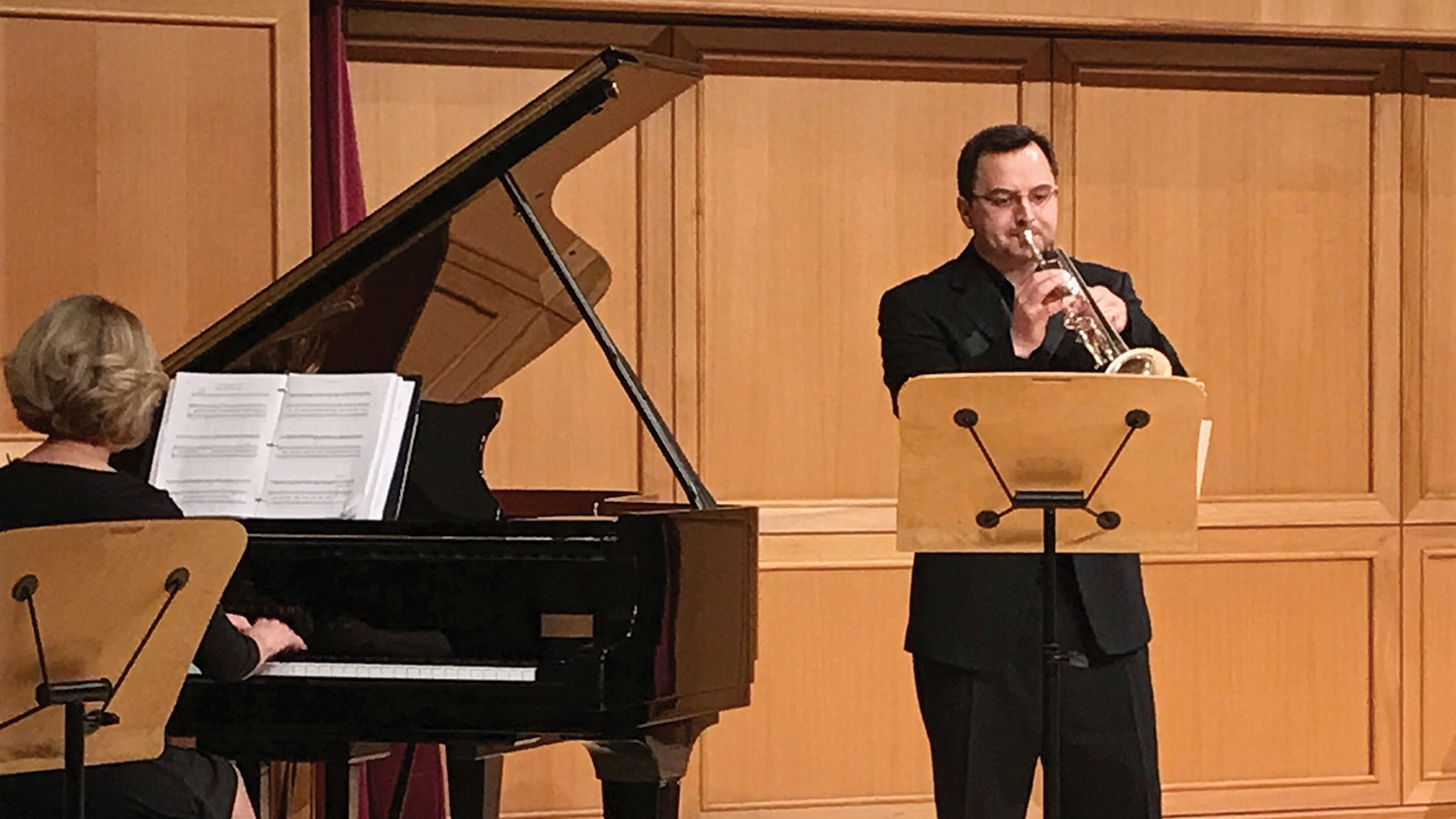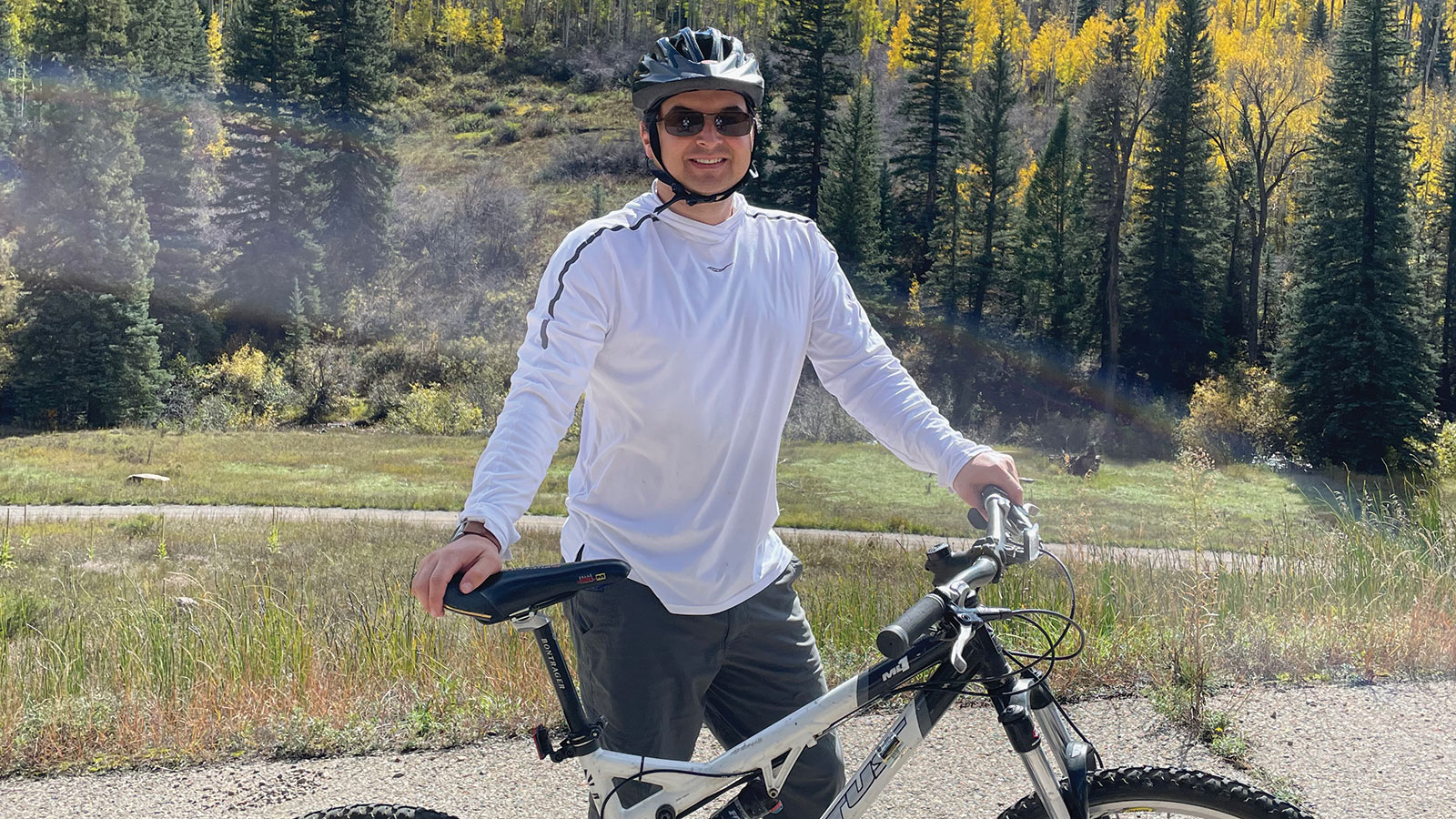
What a Wonderful World
Meet CBA President Judge Baca
July/August 2023
Download This Article (.pdf)
New CBA President Judge Nathaniel Baca has an exceptionally human approach to the law, shaped by a simple principle: the desire to help others. “Growing up, I was not one of the lucky people who knew what I would be at a young age. But what I had as a child was the start of something fundamental to how I practice law: I enjoyed helping people. This simple emotion was my primary motivation for exploring the law and finding a way to help others,” says Baca.
“During my childhood, I did not have access to lawyers or people in the legal profession. I grew up in a small town in the Four Corners area. As a result, my understanding of conflict resolution grew not through the lens of statutes or caselaw but through discussions between family members. I’m blessed to have come from a family who believed in supporting each other, supported my goals, and gave me room to explore my curiosities.”
Musical Roots
By the time he reached college, Baca was pursuing a career as a professional musician. When an ear injury put an end to that aspiration, he pivoted to a career in the law. While it may seem a left turn to some, for Baca, it made sense. “For me, the connection between law and music is the desire to share, collaborate, and build emotional and intellectual connections with other people. As a musician, empathy with the composer and with the audience has always been deeply important. I find the stories, emotions, and history behind songs fascinating.
“As a performer, it’s important to study the scores and understand the history behind the songs we play. This study and practice allowed me, as a musician, to properly share the complete song and what the song represents. I find that this approach is similar to the way I like to practice law, in that it is valuable to understand the stories and history of my clients as well as the history behind the law. These stories can be illuminating and, when I began connecting them, I became a more effective advocate and began to hold a greater appreciation and sense of success for my own work.
“Every performer wants their audience to be touched and moved in some way. The law is an even greater opportunity to help people when they need it most and to let them, hopefully, find a path for the future.”
To this day, music stays with Judge Baca. It’s one of his favorite ways to unwind. “When I’m off the clock, I enjoy playing the trumpet and spending time with my family. I’m lucky to have two children and a wonderful wife. I have a wonderful mother, brother, and extended family. I hope we can always share a big bowl of piñons around the holidays with room for every hand,” says Baca. “Regardless of how my day went, family and music will always be my way to feel the beauty of being alive.”
Path to Judgeship
Following law school, Baca had a varied career encompassing work as a public defender, criminal defense attorney, and legal researcher, along with a role at the Institute for the Advancement of the American Legal System (IAALS) at the University of Denver. During the pandemic, Baca started applying for judgeships.
“I’ve always been interested in working as a judge. I enjoy resolving disputes and trying to find pathways forward for people in difficult situations.” As COVID closed down most in-person interactions, Baca began homeschooling his children and found that it worked well for them. “As a result, I began considering part-time judgeships, which would allow me to balance work and family while growing into a position that would be deeply meaningful. The opportunity to be a part-time judge gave me a new step in my career while providing the freedom for me to help my children learn and grow. As my children move beyond homeschooling, I’ve been fortunate to be appointed to a full-time judicial position in the 6th Judicial District.”
Challenges and Opportunities at the CBA
Throughout his career, the CBA has always been an important organization to Baca. He values the sense of community it provides and the opportunity to have a more significant impact. “When you’re part of the CBA, you can work on issues that are impossible to address on your own. Being part of the CBA gives you the support, experience, and nimbleness to build a better future.”
Reflecting on the year ahead, Baca says, “At this time, I see two substantial challenges at the CBA that will be my priority as CBA president. First, we face continuing adjustments in our lives and practices due to COVID. The legal community has become fractured and isolated. These changes have resulted in increased mental health issues among professionals and fewer collaborative and supportive social interactions. It’s essential for the CBA to create opportunities for community building and support. We’re lucky to have excellent leaders to lean on, and we must work with them to build a collaborative legal community that reflects an appreciation for our well-being, our aspirations, and the overall success of our practices. Second, we are witnessing some of the biggest technological opportunities that the legal practice has ever seen. The CBA must be at the forefront of explaining how these technologies can be leveraged in our practice and utilized to increase access to justice.
“Throughout the year and during my presidency, I hope to work with local bar associations across the state to understand the pain points that we face and to begin identifying solutions to those pain points. We can quickly improve our community if we actively identify our problems, work toward solutions, and share those solutions with each other.”
As president, Judge Baca also will draw on his work at IAALS. “I’ll always be deeply appreciative of the opportunity I had to work with Justice Kourlis at IAALS. She’s a phenomenal human being who has shaped our world and will continue to do so, in and out of the law. Working with her at IAALS, some of the things that I took away were the need to provide efficient and effective resources through right-sizing and taking advantage of technology to streamline services. The legal world is rapidly changing through services such as artificial intelligence tools, virtual courts, and licensed legal paraprofessionals, to name a few. I believe it’s incumbent upon the CBA to understand these tools and support our members to use them effectively.
“I want the benefits of membership to be obvious to the legal community. There’s a great opportunity, perhaps the greatest opportunity that the legal community has ever seen, for CBA members to build highly successful practices, to improve their communities, and to address access to justice issues.”
Reengaging and Supporting Members
Baca empathizes with the plight of those new to the profession and hopes to engage them as well, emphasizing how the CBA can address their needs. “New lawyers and judges face a steep learning curve. When I graduated from law school, I worked for the Public Defender’s Office and learned from a large group of criminal defense attorneys whose vast well of knowledge seemed bottomless. To the extent possible, all new attorneys and judges should find similar groups of people who can help them understand the contours and nuances of their areas of law. For many, the CBA is the best way to gain such access. Programs like COBALT, CODACC, and the YLD can immediately connect lawyers with a wealth of expertise and knowledge.
“Similarly, the CBA allows all lawyers to be part of something greater than themselves. We can work to achieve the potential of our profession and ourselves by reengaging and supporting each other at the CBA.”
Baca sums up his hopes for his term this way: “I used to tell clients that one of my jobs as a lawyer was to take the boulder off their backs. I hope that my time as president can be used to find the boulders that we bear and work together to lighten our collective burdens.”
This idea of mutual support is something Baca puts into practice in his courtroom. “I actively work to give lawyers opportunities to present their best selves. I find that my work is the most productive and rewarding when the people around me are motivated to practice to their greatest ability, and when they feel supported.”
Positive Vibes Only
Perhaps this all goes back to the idea of the musician harmonizing with the others on stage. When asked about the best advice he’s received, Baca says it’s to “give yourself wholly and entirely to the opportunities you have now. For example, before I suffered the ear injury that derailed my musical career, I didn’t take the time to enjoy each performance fully. I treated the performances more like a job than an opportunity. But after the injury, I realized that each time we stand up and do what we love, it might be the last time we ever get to do that thing.
“When I perform now, I genuinely enjoy the opportunity to make something beautiful with others and to support others as they work to create something beautiful. Moving from music to the law, I have an obligation as a judge to support all lawyers in my courtroom and to encourage them to strive to do their best work every day. It is only through a race to the top that we can reach the top. We must support each other to give our greatest performance every day.”




